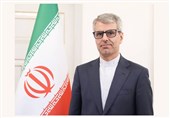Israeli Regime Moving toward Downfall, Collapse, Hezbollah Chief Says
TEHRAN (Tasnim) – The Lebanese Hezbollah resistance movement’s secretary general expressed solidarity with the Palestinian people in the face of the savage enemy, stressing that the unfolding developments in the occupied territories signify the Israeli regime's downfall.
“The course of developments in the occupied Palestine indicates that Zionists are moving toward downfall and collapse. All decisions taken by Israeli authorities would only reinforce the determination, faith and perseverance of Palestinian people to carry out more retaliatory operations,” Seyed Hassan Nasrallah said in a televised speech during a Monday ceremony in the Lebanese capital city of Beirut in commemoration of veteran Hezbollah fighters.
He lambasted the far-right cabinet of Israeli prime minister Benjamin Netanyahu for passing a draft bill, which after becoming a law would authorize the execution of Palestinian prisoners, saying, “The savage Israeli enemy believes it can deter Palestinians by posing threats against Palestinian resistance fighters, and imposition of death penalty on them.”
“We express our solidarity with Palestinian prisoners, and take on our own responsibility in this regard. The entire Muslim world is obliged to support the Palestinian nation in the face of the Israeli regime,” Nasrallah said.
“I address Palestinian prisoners, their families and the entire Palestinian nation that the Lebanese nation is all aware of the pains and sufferings that you are now enduring in the West Bank, Huwara, Nablus and East al-Quds, as we have experienced the sufferings throughout all years of Israeli occupation and heroic resistance,” the Hezbollah leader said.
He added, “Thousands of Lebanese resistance fighters have been arrested and held in Israeli jails either in southern Lebanon or elsewhere across the occupied Palestinian territories. The Lebanese youths should know about them and the sacrifices they have made.”
The Hezbollah chief further highlighted that his movement is acting as a deterrent force in the face of the Israeli military, and its military prowess and defense capabilities enable Lebanese Armed Force to protect the country’s southern borders and confront any possible act of aggression by Israel.
“Diligent efforts must be made in order to liberate Shebaa Farms and Kafrchouba Hills from the grip of the Israeli occupation. All those who care about Israel’s security, above all the United States, seek to strip Lebanon of its strong position,” Nasrallah said.
The Hezbollah leader went on to stress that the demarcation of Lebanon’s southern maritime border with Israel does not translate into normalization of ties with the occupying regime, warning against any delay in oil and gas exploration activities in Lebanese territorial waters.
Elsewhere in his remarks, Nasrallah emphasized that Hezbollah does not accept the power vacuum in Lebanon after President Michel Aoun left the presidential palace on October 30 last year, and strongly supports the election of a new head of state.
“Hezbollah insists on the two-third quorum for the parliament to convene and elect a new president. We categorically reject any foreign diktats to impose a president on Lebanon,” he stated.
Nasrallah added that Hezbollah will back Christian politician Suleiman Frangieh to be the country's president.
"The natural candidate we support in the presidential elections is (former) minister Suleiman Frangieh," Nasrallah said.
Lebanon’s presidency has seen stalemate several times since the 1975-1990 civil war. The country has also had only a caretaker government since May 2022.
The Arab country has been mired in an economic crisis that the World Bank has described as one of the worst in recent history, which comes amid crippling sanctions imposed by the US and its allies.
The Lebanese pound has lost more than 95 percent of its value on the black market since 2019.
According to the United Nations, the ongoing financial crisis in Lebanon has caused poverty rates to reach more than 80 percent of the population, and food prices have risen by an astonishing 2,000 percent.






